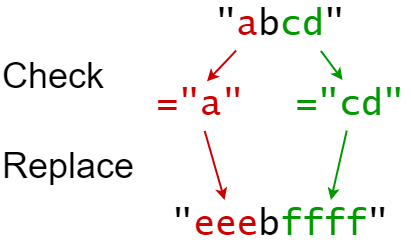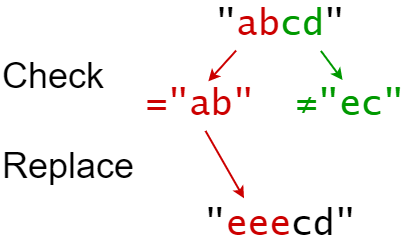- {x}
- Friends Of Appropriate Ages
- Most Profit Assigning Work
- Making A Large Island
- Count Unique Characters of All Substrings of a Given String
- Consecutive Numbers Sum
- Positions of Large Groups
- Masking Personal Information
- Flipping an Image
- Find And Replace in String
- Sum of Distances in Tree
- Image Overlap
- Rectangle Overlap
- New 21 Game
- Push Dominoes
- Similar String Groups
- Magic Squares In Grid
- Keys and Rooms
- Read More...

Find And Replace in String
You are given a 0-indexed string s that you must perform k replacement operations on. The replacement operations are given as three 0-indexed parallel arrays, indices, sources, and targets, all of length k.
To complete the ith replacement operation:
- Check if the substring
sources[i]occurs at indexindices[i]in the original strings. - If it does not occur, do nothing.
- Otherwise if it does occur, replace that substring with
targets[i].
For example, if s = "abcd", indices[i] = 0, sources[i] = "ab", and targets[i] = "eee", then the result of this replacement will be "eeecd".
All replacement operations must occur simultaneously, meaning the replacement operations should not affect the indexing of each other. The testcases will be generated such that the replacements will not overlap.
- For example, a testcase with
s = "abc",indices = [0, 1], andsources = ["ab","bc"]will not be generated because the"ab"and"bc"replacements overlap.
Return the resulting string after performing all replacement operations on s.
A substring is a contiguous sequence of characters in a string.
Example 1:

Input: s = "abcd", indices = [0, 2], sources = ["a", "cd"], targets = ["eee", "ffff"] Output: "eeebffff" Explanation: "a" occurs at index 0 in s, so we replace it with "eee". "cd" occurs at index 2 in s, so we replace it with "ffff".
Example 2:

Input: s = "abcd", indices = [0, 2], sources = ["ab","ec"], targets = ["eee","ffff"] Output: "eeecd" Explanation: "ab" occurs at index 0 in s, so we replace it with "eee". "ec" does not occur at index 2 in s, so we do nothing.
Constraints:
1 <= s.length <= 1000k == indices.length == sources.length == targets.length1 <= k <= 1000 <= indexes[i] < s.length1 <= sources[i].length, targets[i].length <= 50sconsists of only lowercase English letters.sources[i]andtargets[i]consist of only lowercase English letters.
Solution Explanation: Find And Replace in String
This problem requires performing multiple string replacements simultaneously without overlapping replacements affecting each other's indices. The solution involves a two-step process: identifying replacements and then applying them.
Approach:
-
Identifying Replacements: We iterate through the
indices,sources, andtargetsarrays. For each indexiinindices, we check if the corresponding substringsources[k]exists at that index in the input strings. If it does, we store the indexiand the corresponding target indexkin a dictionary or array (din the code examples). This ensures that we know which substring needs replacing and with what. -
Applying Replacements: We iterate through the input string
s. If we encounter an indexithat's marked for replacement ind, we append the correspondingtargets[k]to the result. Otherwise, we append the original characters[i]to the result.
Time and Space Complexity Analysis:
-
Time Complexity: O(N + KM), where N is the length of the input string
s, K is the number of replacement operations, and M is the maximum length of any substring insources. The first step (identifying replacements) takes O(KM) because we potentially check for matches up to length M for each of the K operations. The second step (applying replacements) takes O(N) because we iterate through the string once. -
Space Complexity: O(N), dominated by the space used for the resultant string. The auxiliary space used for
dis O(N) in the worst case (all characters are replaced) and O(K) in the best case (no replacements). In practice, it will likely be between O(K) and O(N) depending on the number of replacements.
Code Explanation (Python):
class Solution:
def findReplaceString(
self, s: str, indices: List[int], sources: List[str], targets: List[str]
) -> str:
n = len(s)
d = [-1] * n # Array to store replacement information (-1 means no replacement)
# Step 1: Identifying Replacements
for k, (i, src) in enumerate(zip(indices, sources)):
if s.startswith(src, i): # Check if source substring exists at index i
d[i] = k #Store the index i and target index k
ans = [] # Build resultant string
i = 0
while i < n:
if d[i] != -1: #If there is replacement at this index
ans.append(targets[d[i]]) #Append the target string
i += len(sources[d[i]]) #Advance the index by the length of the source string
else:
ans.append(s[i]) # Append the original character
i += 1
return "".join(ans) #Return the combined string
The other language implementations follow a similar logic, using appropriate data structures (arrays or hash maps) for efficient replacement tracking. The key is the two-step process of identifying and then applying the replacements while ensuring that the indexing doesn't get disrupted due to simultaneous operations.